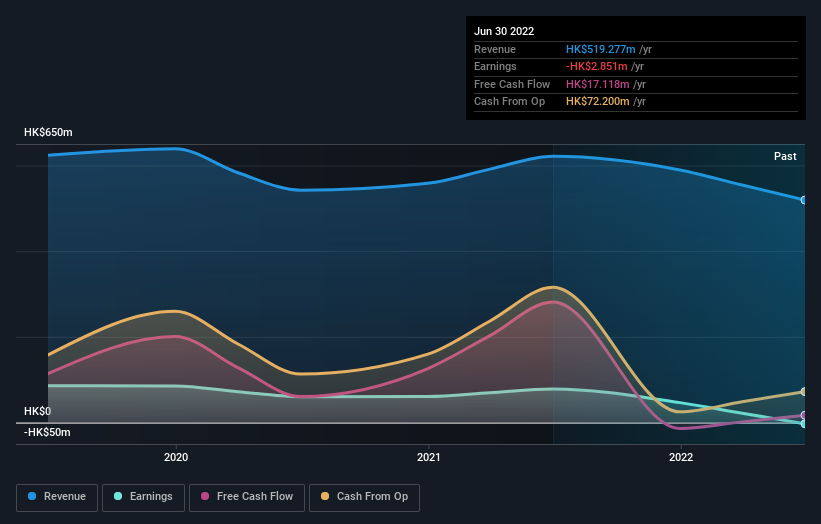[ad_1]
To get a sense of who is truly in control of Dongwu Cement International Limited (HKG:695), it is important to understand the ownership structure of the business. And the group that holds the biggest piece of the pie are individual insiders with 71% ownership. In other words, the group stands to gain the most (or lose the most) from their investment into the company.
As market cap fell to HK$1.9b last week, insiders would have faced the highest losses than any other shareholder groups of the company.
In the chart below, we zoom in on the different ownership groups of Dongwu Cement International.
Check out the opportunities and risks within the HK Basic Materials industry.

What Does The Lack Of Institutional Ownership Tell Us About Dongwu Cement International?
Institutional investors often avoid companies that are too small, too illiquid or too risky for their tastes. But it’s unusual to see larger companies without any institutional investors.
There could be various reasons why no institutions own shares in a company. Typically, small, newly listed companies don’t attract much attention from fund managers, because it would not be possible for large fund managers to build a meaningful position in the company. On the other hand, it’s always possible that professional investors are avoiding a company because they don’t think it’s the best place for their money. Dongwu Cement International’s earnings and revenue track record (below) may not be compelling to institutional investors — or they simply might not have looked at the business closely.

Hedge funds don’t have many shares in Dongwu Cement International. The company’s largest shareholder is Hok Ming Tseung, with ownership of 54%. This essentially means that they have extensive influence, if not outright control, over the future of the corporation. Meanwhile, the second and third largest shareholders, hold 12% and 4.6%, of the shares outstanding, respectively. Xuanlin Chen, who is the third-largest shareholder, also happens to hold the title of Member of the Board of Directors.
While studying institutional ownership for a company can add value to your research, it is also a good practice to research analyst recommendations to get a deeper understand of a stock’s expected performance. Our information suggests that there isn’t any analyst coverage of the stock, so it is probably little known.
Insider Ownership Of Dongwu Cement International
The definition of an insider can differ slightly between different countries, but members of the board of directors always count. Company management run the business, but the CEO will answer to the board, even if he or she is a member of it.
Insider ownership is positive when it signals leadership are thinking like the true owners of the company. However, high insider ownership can also give immense power to a small group within the company. This can be negative in some circumstances.
Our most recent data indicates that insiders own the majority of Dongwu Cement International Limited. This means they can collectively make decisions for the company. So they have a HK$1.4b stake in this HK$1.9b business. Most would argue this is a positive, showing strong alignment with shareholders. You can click here to see if those insiders have been buying or selling.
General Public Ownership
With a 29% ownership, the general public, mostly comprising of individual investors, have some degree of sway over Dongwu Cement International. This size of ownership, while considerable, may not be enough to change company policy if the decision is not in sync with other large shareholders.
Next Steps:
I find it very interesting to look at who exactly owns a company. But to truly gain insight, we need to consider other information, too. Consider risks, for instance. Every company has them, and we’ve spotted 1 warning sign for Dongwu Cement International you should know about.
Of course this may not be the best stock to buy. Therefore, you may wish to see our free collection of interesting prospects boasting favorable financials.
NB: Figures in this article are calculated using data from the last twelve months, which refer to the 12-month period ending on the last date of the month the financial statement is dated. This may not be consistent with full year annual report figures.
Valuation is complex, but we’re helping make it simple.
Find out whether Dongwu Cement International is potentially over or undervalued by checking out our comprehensive analysis, which includes fair value estimates, risks and warnings, dividends, insider transactions and financial health.
View the Free Analysis
Have feedback on this article? Concerned about the content? Get in touch with us directly. Alternatively, email editorial-team (at) simplywallst.com.
This article by Simply Wall St is general in nature. We provide commentary based on historical data and analyst forecasts only using an unbiased methodology and our articles are not intended to be financial advice. It does not constitute a recommendation to buy or sell any stock, and does not take account of your objectives, or your financial situation. We aim to bring you long-term focused analysis driven by fundamental data. Note that our analysis may not factor in the latest price-sensitive company announcements or qualitative material. Simply Wall St has no position in any stocks mentioned.
[ad_2]
Source link








